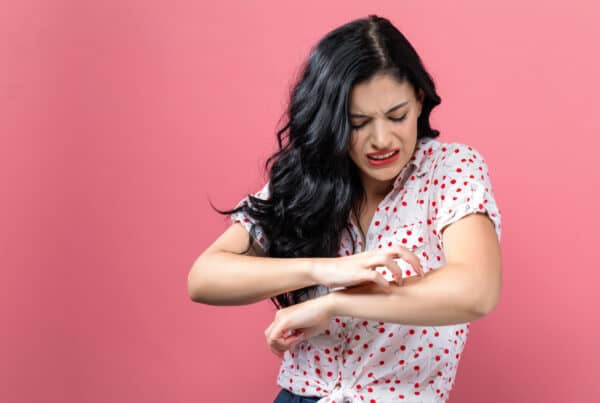Movement – what a great gift, yet often underappreciated…until you lose it!
I lost it, movement that is, along with my peace of mind, all in one day! After being an active Secondary Drama teacher for ten years, I woke up one morning to discover that I couldn’t move my left leg without excruciating pain.
My crumbled knee was the culmination of years of osteoarthritis, and now I was confined to my bed or wheeling myself around in an office chair, popping Panadol and applying ice! My mood matched my physical condition- complete deflation and despair!
Inactivity and depression was nothing new to me – I often see it in my students, suffering from ‘Mondayitis’, dragging themselves into the classroom looking half asleep. But much of Drama consists of movement, so every lesson I get my students onto their feet and moving! Walking and jogging around our room, despite the groans and moans, it is really interesting to feel the mood change as they move their arms, legs and entire bodies.
We regularly engage in physical warm-ups, synchronised activities, focus exercises, and Theatre Sports to prepare our bodies and mind for performance. Amazingly enough, after engaging in Drama activities and games, the atmosphere in my room changes completely, from tired and dreary to upbeat and positive. That’s the power of movement!
The following link will take you to some fabulous, fun games to keep you and your kids active! https://theatrelinks.com/theatresports-and-drama-games/
On researching the link between movement and mental health, I discovered that the connection between the body and brain is a two-way street, and that movement can actually make changes in the brain. I discovered that regular exercise, such as cycling, gym-based exercises, flexibility and balance can reduce depression, and sometimes as effectively as medications and psychotherapies.
In fact, regular exercise may boost a person’s mood by increasing the brain protein BDNF that helps nerve fibres grow. www.health.harvard.edu/blog/how-simply-moving-benefits-your-mental-health-201603289350
In Drama, my students learn how to be ‘in tune’ with each other as we practise synchronised movement, which can be as simple as mirroring one another’s movements exactly. Mime is also a valuable tool in getting students to move as it is a non-talking art form expressed entirely through the body, gestures and facial expressions. This provides a wonderful opportunity to get children moving.
Physical Theatre, a Drama form perfected by Zen Zen Zo Theatre Company, is something my senior Drama students really enjoy. (See link to YouTube video.) Using simple movements such as jumping, jogging or marching on the spot in synchronisation with one another helps their self-esteem, and the cooperation with others helps to make the students more charitable and forgiving of others’ mistakes. Because of the intimate connection between the mind and body, the way people move can affect the way they think and feel. www.youtube.com/watch?v=Ym8xz1JsMBw
Children and teenagers are naturally competitive and an improvisation competition is lots of fun and gets them collaborating and moving their bodies as a team. I have included a link with ideas for some easy and fun improvisation games for younger children and there are plenty of other resources to be found on the Internet. www.childfun.com/recommendations/best-improv-games-for-kids/
The World Health Organisation has identified a sedentary lifestyle as one of the leading causes of disease and death, and one of the questions it poses is, ‘why don’t people exercise, even a little?’. This is a question I asked too, in my state of immobility and frustration at not even being able to walk my dog! My brother-in-law, who suffered from severe depression after losing his job, slipped into a sedentary lifestyle and was far too young when he passed away. This is a trap people can fall into and it can become a vicious cycle of depression, retreat, and passive entertainment, leading to obesity, a reduction in physical activity, and eventual morbidity.
Physical inactivity is increasing globally, and we know that it affects children and teenagers too. In Australia alone, only 19 percent of children aged 5 – 17 are physically active, gaining the recommended sixty minutes of moderate activity every day. Most of the sedentary time in children is attributed to screen time, watching television, and playing computer games. www.who.int/news/item/04-04-2002-physical-inactivity-a-leading-cause-of-disease-and-disability-warns-who
Of course the COVID lockdowns have not helped our young people to become physically active and positive about life. Sadly, suicide is a leading cause of death in mostly male Australians aged 14 – 44, according to Lifeline. During lockdown the number is higher due to feelings of loneliness and isolation. https://researchmgt.monash.edu/ws/portalfiles/portal/320564719/320142253_oa.pdf
The advantages of movement and exercise are numerous and the positive outcomes for the body are well-known, but one often-overlooked benefit is the impact of physical activity on mental health, including anxiety and depression. Movement relieves stress by reducing the levels of stress-related hormones in the body such as cortisol and adrenaline, while releasing endorphins such as dopamine.
Exercise helps people handle and prevent stress, which improves the quality of life and may also improve self-confidence and personal image. Movement promotes better sleep quality and quantity and may promote sharper memory and thinking. It boosts mental clarity and improves attention span. www.healthline.com/health/depression/exercise#Can-diet-impact-your-mental-health
One thing I have learnt, through my personal experience, is to have an attitude of gratitude for the amazing way my body has been put together to enable mobility – to experience the sheer joy of a walk on the beach, a hike in the mountains, or a family bike ride.
Now that I have a brand new knee, thanks to a reconstruction, I am determined to never take my movement for granted as it does wonders, not just for my body, but also my mind and my soul.





